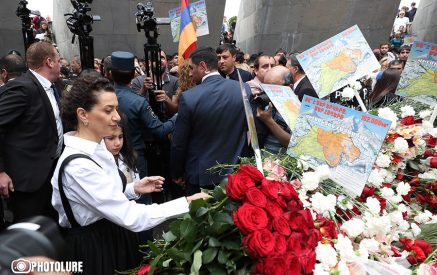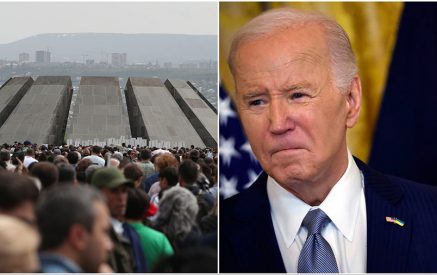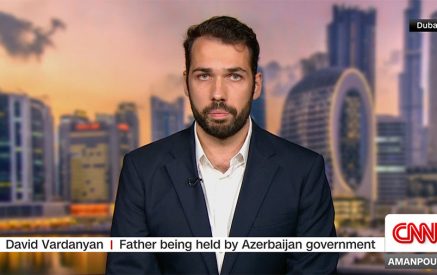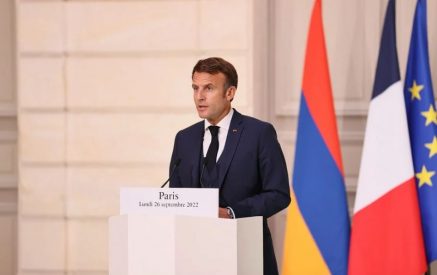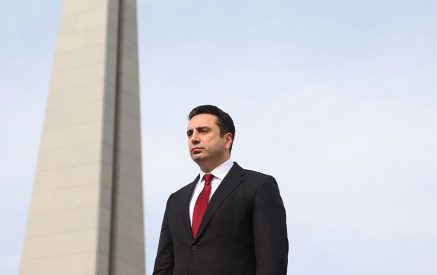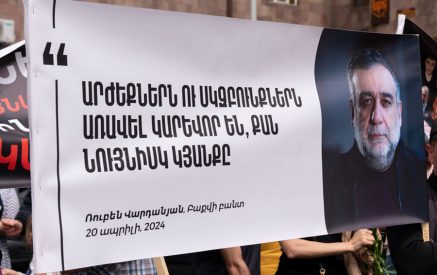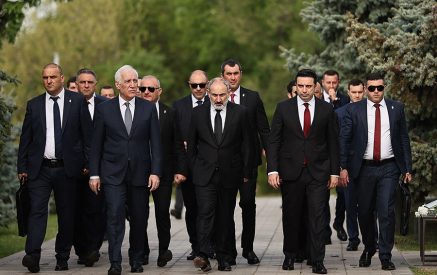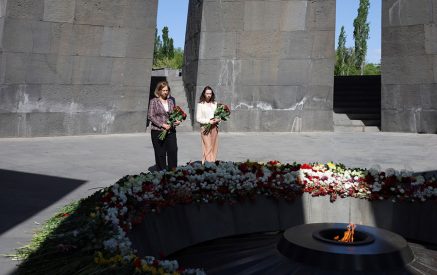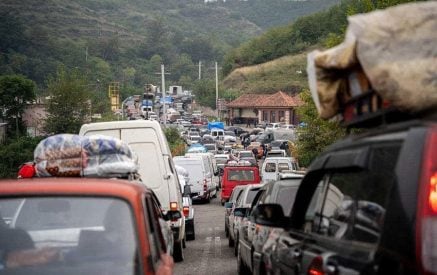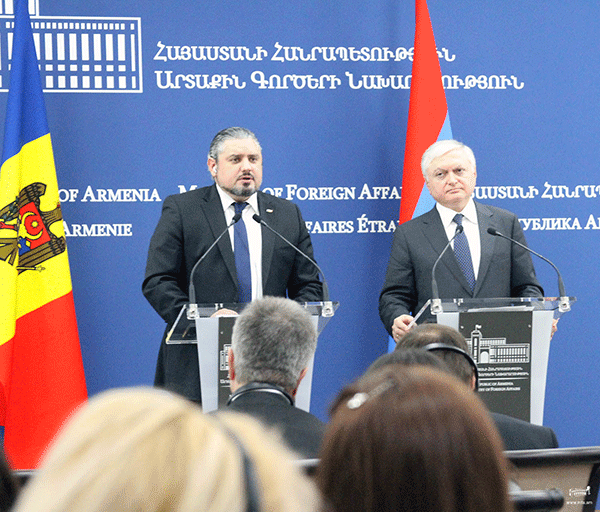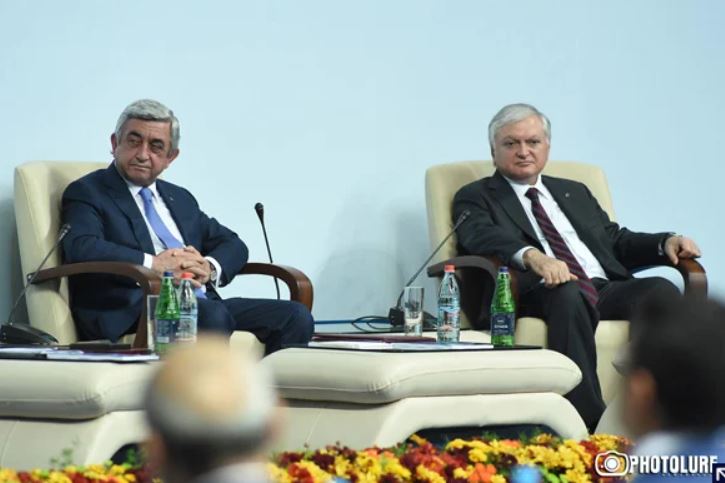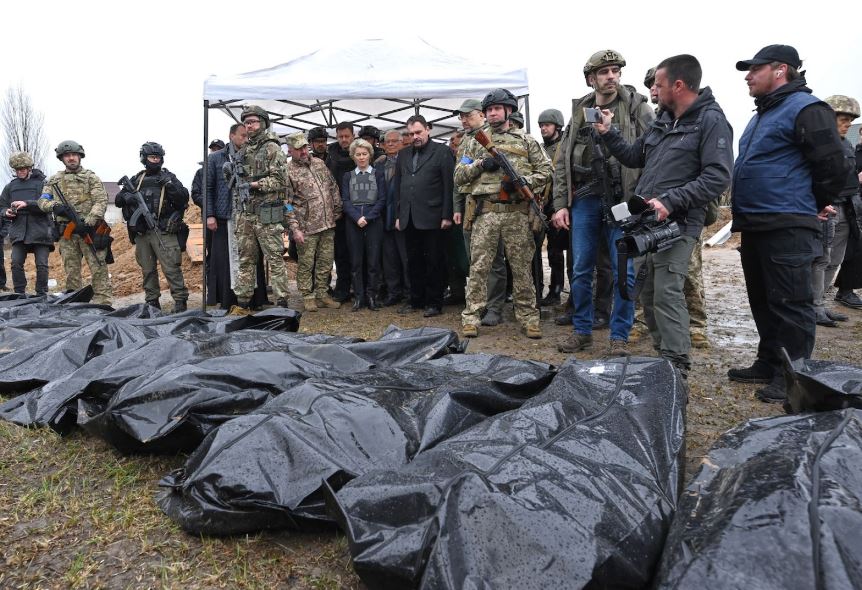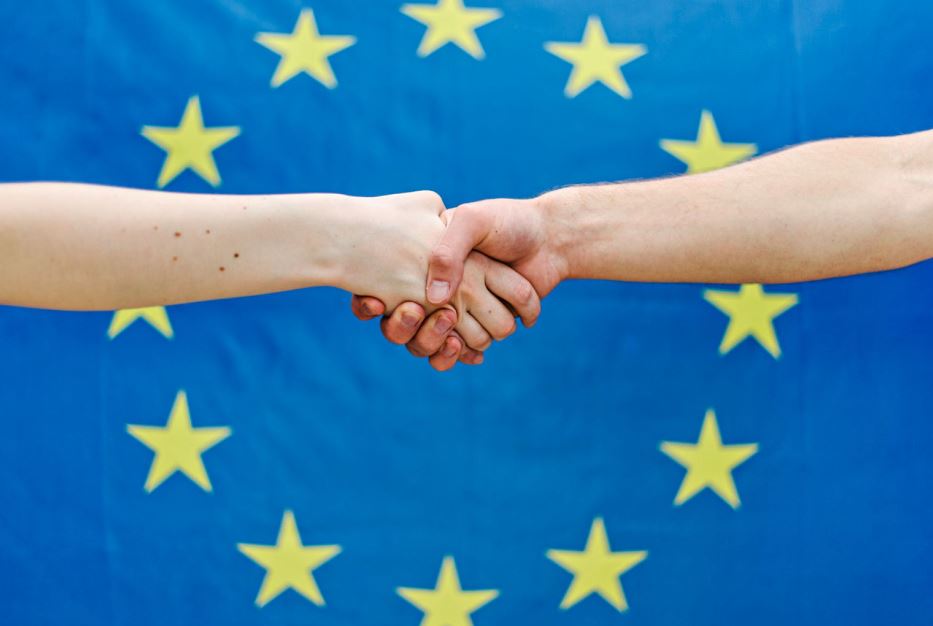Dear Andrei,
Ladies and gentlemen,
I am glad to welcome today in Yerevan my colleague and my good friend, Andrei Galbur, Deputy Prime Minister, Minister of Foreign Affairs and European Integration.
Today my colleague and I had a comprehensive discussion on bilateral and multilateral agenda, as well as current international and regional issues. Armenia attaches importance to the deepening of friendly relations with Moldova
We exchanged views on the steps to be undertaken towards the further development of cooperation between the two countries, discussed the ways to give a new impetus to the collaboration in area of trade and economy, attached importance to the intensification of exchanges in the fields of science, education and culture.
We highlighted the expansion of legal framework and within that context I would like to emphasize that we have just signed four new documents, particularly, agreements on the abolition of visa regime for the citizens of Armenia and Moldova, tourism, as well as cooperation in the areas of science and education, the programme of 2017-2018 consultations between the Foreign Ministries of the two countries.
Read also
During the meeting we also exchanged views on the intensification of interparliamentary ties, holding of consultations between the Ministries of Foreign Affairs, strengthening of cooperation within the international organizations.
I informed Minister Andrei Galbur on on the ongoing negotiations over the new framework agreement between Armenia and the European Union. In his turn, Mr. Galbur presented the recent developments in the process of Moldova’s European integration.
Naturally, the issue of peaceful settlement of regional conflicts was also on the agenda of the meeting. We shared the view that all the conflicts should be resolved exclusively through peaceful means. Within this context I presented to my Moldovan counterpart the efforts exerted by Armenia and the OSCE Minsk Group Co-Chair countries to create conductive conditions for the advancement of negotiation process on the peaceful settlement of the Nagorno-Karabakh conflict.
Now I would like to pass the floor to my colleague.
Please, Andrei.
“News.am” News Agency. Minister Nalbandian, could you please clarify why the agreements reached during the Vienna and St. Petersburg summits have not been implemented after so many months?
Edward Nalbandian. The reason is obvious. And we have emphasised on numerous occasions, that till now the agreements reached in Vienna and St. Petersburg have not been implemented because of Azerbaijan. At the same time, the Azerbaijani side tries to mislead the international community, distort the reality in order to circumvent the implementation of commitments that it has made during those summits.
Azerbaijan started with claiming that the Ministers of the Co-Chair countries expressed their personal opinion in their statement issued after the Vienna meeting. Maybe the Azerbaijani falsifiers could not imagine that just a month later they would be caught in a rather awkward situation when the new joint statement issued after St. Petersburg summit, this time on the level of the Presidents of Russia, Armenia and Azerbaijan, reaffirmed the agreements reached in Vienna. If there were no agreements reached in Vienna then what was the President of Azerbaijan reaffirming in St. Petersburg?
Let me remind what agreements the Ministers of the Co-Chair countries were speaking about: the creation of investigation mechanism, as well as the expansion of the Office of the Personal Representative of the OSCE Chairperson-in-Office. The same scenario unfolded couple of months before that, in December 2015 during the Bern summit, after which the Co-Chair countries publicly stated that the Presidents of Armenia and Azerbaijan supported the Co-Chairs’ efforts aimed at the creation of investigation mechanism. Baku immediately reacted that no agreement was reached, as there was no need of such mechanism.
How come that everyone understands in a same way, and I mean not only one country, but the United States, Russia, France, let alone Armenia, while Azerbaijan understands in a completely different way. Moreover, last September, when the Foreign Ministers met on the sidelines of the UN General Assembly, the Co-Chairs urged Azerbaijan to follow Armenia and to agree to the creation of the mechanism. They underscored that Armenia had agreed to that and they were expecting Azerbaijan to do the same. It was clearly stated.
Azerbaijan went even further after the Vienna meeting of May 16. On June 3rd the Co-Chairs stated that they met the Foreign Minister of Azerbaijan on May 31st and the Foreign Minister of Armenia on June 2nd and based on the previously reached agreements and decisions presented to them two drafts on the creation of the mechanism and the expansion of the team of Andzey Kasperczyk, Personal Representative of the OSCE Chairperson-in-Office.
So, what are those non-existing agreements and not adopted decisions that serve as a basis for the Co-Chair countries to elaborate drafts and present them to the Foreign Ministers?
Unfortunately, right on June 3rd Azerbaijan rejected those proposals. A few days ago in Vienna, the Ambassador of Azerbaijan claimed to reveal a secret. So what was this about? Allegedly, according to them, an agreement has been reached to create the mechanism, after, so-called, withdrawal of the Armenian forces.
But if this was the essence of the Co-Chairs’ proposals, and that was included in their draft documents, then why Azerbaijan rejected it? This is another demonstration of the same blatant lie, which they keep repeating since the summits of 2011, 2012 in Sochi, when the Presidents of Russia, Armenia and Azerbaijan in their Joint Declaration stressed the necessity of the creation of the investigation mechanism. Upon arrival to Baku just on the next day of summits, they reiterate that there were no agreement reached. And still continue to do the same.
The same applies to the expansion of Mr. Kasperczyk’s team. The issue was discussed several times within the OSCE framework, in the respective committee, with the aim of budget allocation. In June alone, on the 3rd, 7th and 26th, Azerbaijan thrice rejected the proposal, opposing rest of the OSCE participating states. And up until now Baku is engaged with “Eastern bazaar” on the number and location of those observers. It tries to locate the observers as far from the Line of Contact as possible so that they could not see anything. And in case they wish to conduct a monitoring, Azerbaijan claims they should obtain a prior permission from them. The request should come long before, so that Azerbaijan has enough time to prepare and organize a show. Thus, the observers would enjoy the Azerbaijani shows instead of conducting the monitoring. Whom are they deceiving?
This is the reality regarding these agreements reached on a Presidential level both in Vienna and St. Petersburg. I would like to remind that those summits took place after the Azerbaijani aggression in early April, which led to the need to create conducive conditions for the advancement of the negotiation process.
Unfortunately, Azerbaijan spares no effort to undermine the creation of such conditions. Why they don’t want to implement those agreements? As it is said, “A guilty mind betrays itself.” It is obvious and everyone knows who violates. However, after the creation of the mechanism and the expansion of the monitoring mission, it will be explicitly and undeniably clear who violates.
There is an impression, that Baku devises its approaches in the best traditions of scriptwriters of soap operas: the more tangled it is, the more it can be prolonged. They speak about the status quo, whereas they are the main reason behind the continuation of that status quo. Neither Armenia, nor Karabakh favour the status quo, since they want exclusively peaceful settlement of the conflict, based on respective principles and norms of international law.
Thank you!










































